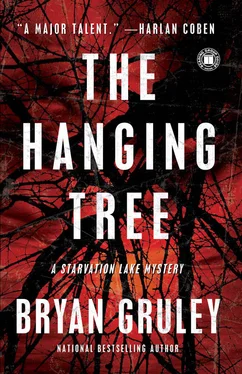Bryan Gruley - The Hanging Tree
Здесь есть возможность читать онлайн «Bryan Gruley - The Hanging Tree» весь текст электронной книги совершенно бесплатно (целиком полную версию без сокращений). В некоторых случаях можно слушать аудио, скачать через торрент в формате fb2 и присутствует краткое содержание. Жанр: Триллер, на английском языке. Описание произведения, (предисловие) а так же отзывы посетителей доступны на портале библиотеки ЛибКат.
- Название:The Hanging Tree
- Автор:
- Жанр:
- Год:неизвестен
- ISBN:нет данных
- Рейтинг книги:3 / 5. Голосов: 1
-
Избранное:Добавить в избранное
- Отзывы:
-
Ваша оценка:
- 60
- 1
- 2
- 3
- 4
- 5
The Hanging Tree: краткое содержание, описание и аннотация
Предлагаем к чтению аннотацию, описание, краткое содержание или предисловие (зависит от того, что написал сам автор книги «The Hanging Tree»). Если вы не нашли необходимую информацию о книге — напишите в комментариях, мы постараемся отыскать её.
The Hanging Tree — читать онлайн бесплатно полную книгу (весь текст) целиком
Ниже представлен текст книги, разбитый по страницам. Система сохранения места последней прочитанной страницы, позволяет с удобством читать онлайн бесплатно книгу «The Hanging Tree», без необходимости каждый раз заново искать на чём Вы остановились. Поставьте закладку, и сможете в любой момент перейти на страницу, на которой закончили чтение.
Интервал:
Закладка:
The ambulance took the tattooed man to a hospital in Traverse City. No charges were filed against Gracie, despite Kruger’s protests that he was entitled to recompense for the shredded sheet and the damage to the wall in number 14. A warrant was issued for the arrest of the naked man, but if he was apprehended, that was not reflected in Dingus’s written report.
Gracie at first told police that she did not know the naked man’s name, but she apparently slipped and referred to him as “YAR-ek”, or at least that’s how Dingus wrote it in his report. I had never heard such a name before. Gracie then insisted that she really did not know this man well, that his last name was too long to pronounce or to spell, that he came from somewhere downstate but she could not remember exactly where.
Dingus’s report said he released Gracie into the custody of Beatrice Carpenter. When I read this, I looked away from the pages and stared down the beach to my left, in the direction of my mother’s house. I imagined Dingus walking Gracie up to the back door, his hand lightly on her elbow, the kitchen lights coming on, my mother in her fuzzy blue robe hugging Gracie and thanking Dingus, who would have kept his lights off so as not to alert the neighbors.
My mother had never said a word to me about this.
Then I remembered why the date-August 26, 1995-had resonated. Darlene and Jason had married on that Saturday. I had heard about the wedding from Soupy but of course had not been invited and remained in Detroit that weekend, working.
My mother later asked me if I had heard that Darlene had wed. By then it was Labor Day weekend and we were sitting on the bench swing that overlooked the lake. I took a long sip on my can of beer and told her, yes, I had heard. Mom then told me the wedding had been nice, but nothing special, which was her way of letting me know that she was sorry-not for herself but for me-that I had not been at the altar with Darlene.
Darlene never said anything about the incident at the Hill-Top Motel. She may not have known about it. In August of 1995, she hadn’t yet moved to the sheriff’s department; she worked then for the Bellaire Police.
I scanned Dingus’s report again quickly, turning it over and back, letting the wind ruffle the corners of the pages. As I was slipping it back into the accordion folder, I noticed a piece of notebook paper crumpled inside.
I pulled it out. Someone had written on it in neat block letters:
J Vend
26669 Harman Street
Melvindale Michigan 48122
twelve
The old rink shuddered with cheers as I walked in.
Through the glass doors between the lobby and the arena, I saw Taylor Haskell glide away from his net with the puck cradled against his chest in his catching glove, his stick held high to ward off opponents who might think of giving him a little after-the-whistle bump. Three young River Rats in their blue-and-gold uniforms coalesced around him, whacking his leg pads with their sticks as Taylor flipped the puck to a referee. Whistles trilled and Taylor returned to his net. The stands exploded again with applause.
The scoreboard said River Rats 1, Maroons 0.
I’d had to park in the First Presbyterian lot a quarter mile from the arena because cops were waving vehicles away from the jammed rink lot. Pickups and SUVs lined the road shoulders for two hundred yards in either direction. A handmade sign taped to the arena’s double-door entrance announced TONIGHT’s GAME SOLD OUT! Luckily, as a Rats alumnus I needed no ticket, regardless of my allowing that title-blowing goal in ’81.
I squeezed into the crowd lining the glass to the left of Taylor Haskell. Though I didn’t play goalie anymore, when I watched a game I still liked to be near the furious action around the net. Be they pros or teens or squirts in jerseys that hung to their shin guards, I liked to see the expressions on their faces, hear the shit-talking between opponents, watch the goaltender try to keep a clear line of vision to the puck through all of the crisscrossing bodies.
From up in the bleachers, hockey looks like a game of savage grace and swift beauty, which it is, but only up close can you see how hunger and poise and guile and anger can make a player who lacks wheels and hands the best player on the ice at any given moment, sometimes the moment that decides a game. Only up close can you see the difference between someone who knows how to play ice hockey and someone who is a genuine hockey player.
As the skaters glided into the face-off circle to his left, awaiting the next drop of the puck, Taylor skated slowly back and forth between his posts, settling himself after his last save. HASKELL read the white-and-gold nameplate across the back of his shoulders, over the numeral 19. Goaltenders usually wore number 1 or 30 or 31 or 35, but I had heard that Taylor wore 19 because it was the number of his favorite Red Wing, Steve Yzerman, and of his most hated Red Wing opponent, the wily sniper Joe Sakic of the Colorado Avalanche. I had never heard of a kid wearing the number of a player he didn’t like; I guessed Taylor had a mind of his own.
The teams lined up at the face-off dot to Taylor’s left. He got into his squat, square to the dot, his catching glove open at his left shoulder, his stick pressing flat against the ice. I wondered if he had always been a goaltender. Many a player becomes a goalie by default: as a six- or seven-year-old, he’s the weakest skater on the frozen lake or the flooded backyard, so he gets stuck standing at one end of the rink, stopping pucks and jumping up and down on his blades to keep warm when the action’s at the other end. But many goalies develop into strong and agile skaters who can stay with the fleetest defensemen and forwards on their teams, even while wearing all that extra armor. And some can shoot as hard as any of them, too, for their arms and wrists have grown sinewy wielding that big stick with those potholder gloves.
But, at least on the ice, they remain alone, always.
I’d thought I quit tending goal because I was tired of waiting around for things to happen. Which is what goalies do, a lot of the time. But now, as the referee dropped the puck and I followed it between one center’s skates to a winger’s stick blade and off the high glass and outside the blue line where the River Rat center gave chase against a Marquette defenseman, I thought maybe I had stopped because I no longer wanted to feel alone.
In the dressing room, in the hockey shop, in the tavern, the goalie is one of the boys. On the ice he is stranded, lost inside his bloated pads, hiding his face behind a mask. When he gives up a goal his teammates figure he should have stopped, he is alone, circling his crease, dousing himself from his water bottle, wishing he had another chance at the shot he was sure he had with the toe of his skate until it hit someone’s knee and deflected just inside the post.
He knows that on the bench the other guys are muttering about the pylon or sieve or funnel between the pipes. He knows that even if he had a chance to explain-the puck took a funny hop, the defenseman left a guy uncovered-he would not be understood. Because nobody sees the game as a goalie does: as a low, flat, horizontal puzzle of bodies and blind spots and caroms and bounces that is constantly being assembled and disassembled on his left, his right, behind him, his left again, in front of him, beneath him, down low, up high. All of which he feels responsible for trying to control. Even if he isn’t, really. Even if it’s ultimately impossible to control, or even make sense of.
Not terribly unlike my day job. Or my life.
Marquette’s number 6 collected the puck and slapped it across the rink to his defensive partner, number 4. Beyond the boards behind him I noticed Darlene and Deputy Skip Catledge standing in uniform at the entrance to the Zamboni shed. No yellow police tape was in sight. The Zamboni driver was dead but the game would go on.
Читать дальшеИнтервал:
Закладка:
Похожие книги на «The Hanging Tree»
Представляем Вашему вниманию похожие книги на «The Hanging Tree» списком для выбора. Мы отобрали схожую по названию и смыслу литературу в надежде предоставить читателям больше вариантов отыскать новые, интересные, ещё непрочитанные произведения.
Обсуждение, отзывы о книге «The Hanging Tree» и просто собственные мнения читателей. Оставьте ваши комментарии, напишите, что Вы думаете о произведении, его смысле или главных героях. Укажите что конкретно понравилось, а что нет, и почему Вы так считаете.












